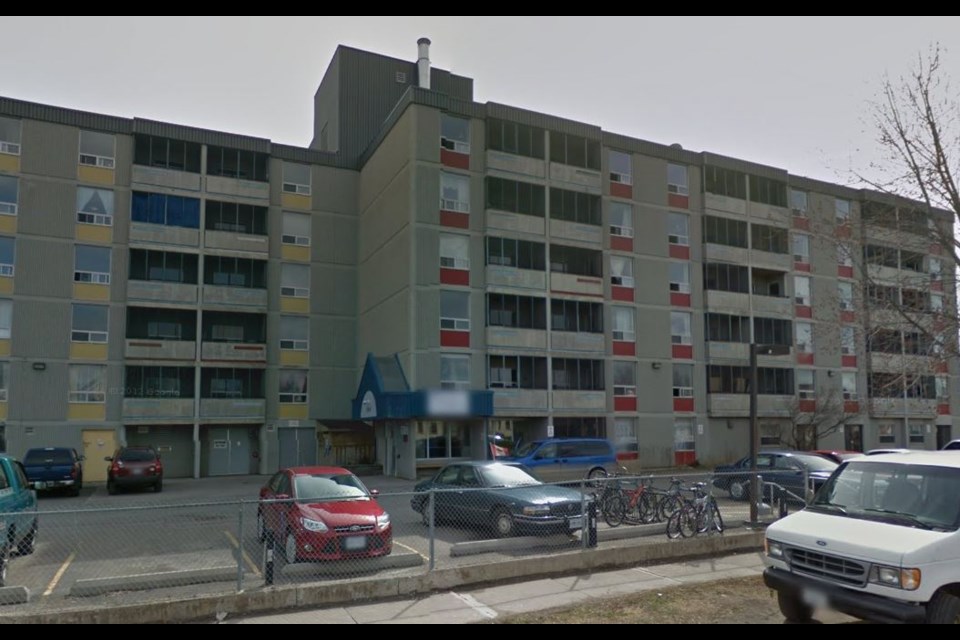THUNDER BAY – A call to address violence and drug issues at a Westfort social housing complex led to a fractious debate over evictions at Thunder Bay’s city council this week.
Coun. Kristen Oliver had put forward a motion calling for 24-hour security and "firmer" evictions policies at the Spence Court apartment building, but wound up withdrawing both of those core provisions hours before Monday's council meeting.
The Westfort Ward councillor had hoped to address what she described as drug- and gang-related violence at the Amelia Street social housing complex, which is run by the Thunder Bay District Social Services Administration Board (DSSAB).
The city has no direct authority over the DSSAB, though Thunder Bay city councillors fill six of the agency’s 14 board seats.
Oliver argued council still had a role to play in addressing the serious concerns she reported hearing from numerous residents.
“They’re looking to us to try to help them and find some hope dealing with the craziness and the concerns they have,” she said. “People are petrified.”
Incidents at Spence Court this year included a Nov. 4 gun homicide, a forced entry involving a shotgun, and a break and enter in which two people were assaulted.
Mayor Bill Mauro said “there was a bit of angst expressed by the DSSAB” after being singled out in Oliver’s motion.
“The issues related to evictions, in their mind, is not only about DSSAB, but all landlords in the city of Thunder Bay,” he told council.
The DSSAB declined a request for an interview for this story, saying it had not yet received any information from the city about the motion.
Thunder Bay police have stated the growing issue of drug-related home takeovers isn’t specific to social housing, but that traffickers often target “vulnerable populations."
“This isn’t the only building this is happening in, I recognize that – it’s happening throughout the city,” Oliver acknowledged, but said the Spence Court situation merits a response.
Oliver pulled back on her calls to add 24-hour security and review DSSAB eviction practices Monday after hearing from leaders with the agency, and being assured that security upgrades were already underway.
She presented a revised motion that would see the city consider advocating for “firmer eviction practices for the safety of residents” under Ontario’s Residential Tenancies Act.
“Since this all came out, there are private landlords who have reached out to say, if you can help us try to get the landlord and tenant act changed so that we can move through the [eviction] process a lot quicker, it’d be better for everyone,” Oliver said.
That call met opposition from a majority on council, who worried making the evictions process easier would ultimately be taken advantage of by landlords.
Coun. Shelby Ch’ng slammed the motion, saying it ran counter to the city’s efforts to combat homelessness.
“How are we fighting homelessness by advocating to evict people in an easier way?” she asked. “This doesn’t address anything – it doesn’t address mental health [and] it doesn’t address transitional housing, which is what we really need, not easier eviction process to get rid of people. These people aren’t going to go anywhere if you evict them, other than on the street.”
“I don’t think we should be advocating for evictions,” agreed Coun. Cody Fraser. “The landlord and tenant act is very rigid – I’d be the first one to tell you that, for private landowners, it’s a nightmare. However, [that’s] to protect the most vulnerable, because the most vulnerable were being taken advantage of by landlords forever.”
Mayor Bill Mauro disagreed, saying residents “would probably be satisfied if they found out there were a few more tools available to help clean up the bad actors in the building.”
“I’m hearing the conversation about, we’re going to be evicting the most vulnerable in our community… that’s not what this would do,” he said. “The people who are the victims in 230 West Amelia are not going to get evicted… they’re the ones that we’re trying to protect.”
Coun. Aldo Ruberto said the city should do “whatever it takes to attack these evil, bad people – the ones who are taking advantage of the poor people, of the addicted people.”
“Everybody’s talking about the rights of this individual, the rights of that individual… If the criminals do something to us, why does everybody talk about the criminal’s rights? Talk about the person that’s affected.”
Ch’ng lamented that rhetoric.
“There’s a lot of discussion around who the ‘bad actors’ are, or the ‘good guys’ versus the ‘bad guys,’” she said. “I’ve sat on the board of the DSSAB for seven years now, and there’s no such thing as 100 per cent good guys or 100 per cent bad guys.”
“I mean, you could be lobbying to evict a grandmother because her son is doing drugs in the house… It’s complex, it’s not just good versus the bad.”
“It isn’t just bad players, sometimes there are criminal elements that are victimizing people in vulnerable situations,” agreed Coun. Brian Hamilton. “It’s a very complex issue.”
Council ultimately voted on the clauses in Oliver’s motion separately, voting down the clause on advocacy for firmer evictions under the Landlord and Tenant Act, but approving two others. One of those directs city manager Norm Gale to connect with DSSAB leadership on the potential for joint advocacy by the city and DSSAB, and the other invites the CEO and chair of the DSSAB to present to city council on how it “may assist with the challenges that residents in TBDSSAB buildings and in other facilities are currently facing.”
Councillors Hamilton, Oliver, Ruberto, You, and Mayor Mauro voted in favour of the motion to pursue advocating for firmer evictions laws; Councillors Aiello, Bentz, Ch’ng, Foulds, Fraser, Giertuga, Johnson, and McKinnon voted against.
